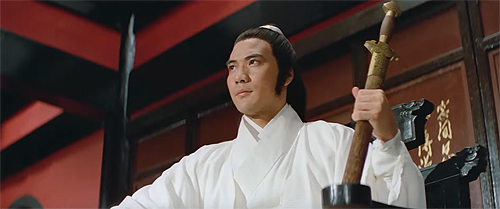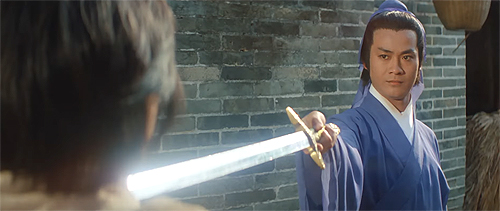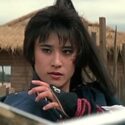Ming Jian, The Sword (1980)
Directed by: Patrick Tam
Written by: Clifford Choi, Shing-Hon Lau, Tianci Liu
Starring: Adam Cheng, Chi-Chi Chen, Eddy Ko, Norman Chui
Available on Eureka Blu-ray the 18th of November
The late 1970s and early ’80s saw a period of films released in Hong Kong known as the New Wave, or the First Wave, during which directors such as Tsui Hark began their film-making careers. It was also the period in which the famous Golden Harvest title card first appeared at the start of action movies; an image certain genre fans can instantly hear the sound of. Patrick Tam’s debut feature The Sword (aka The Famous Sword) falls into this period and under this banner; a minimalist wuxia movie focusing not on honour and revenge but simple ambition. Let’s take a look at this tale of ominous blades and selfish egos and see how it holds up today.

The film looks and sounds very slick thanks to a lot of clean cinematography and a mixture of synthesised and orchestral music. Joseph Koo’s score might be a little repetitive (he’d do his best work a few years later during the Second Wave) but the atmosphere is excellent. It all comes together in an opening that depicts old master Fa Chin-Shu (Feng Tien) discussing the eponymous blade. The ‘Cold Star Sword’ is the latest, and final, work to be completed by sword maker Wong (Tung Ng), but Chin-Shu wants another sword re-forging. However, Wong tells him to destroy the so-called ‘Harmonious Sword’ because it was created with ill-intent and will bring bad luck. Surely such a wise martial artist will follow this sage advice?
Some years pass and young warrior Lee Mak-Yin searches for Chin-Shu to prove himself the best in the business. He seems to want a straightforward duel after many years in training; this will be his final test of skill. However, the old master has gone into hiding to avoid any such trouble. It’s soon obvious that various other characters want to find him for less honourable reasons. With all this going on it would seem appropriate for him to vanish entirely but he’s not doing a great job. As a result Lee soon comes across Chin-Shu’s daughter Fa Ying-Chi (Jade Tsu) being chased by villains who want a hostage. Elsewhere Lee’s childhood sweetheart Yin Siu-Yu (Chi-Chi Chen) has married someone who is also looking for the Cold Star Sword.
If there’s a problem with the film it’s the pacing and the way all these disjointed threads are often forced together by coincidence. After several false starts it seems as though everyone Lee comes across is connected to Chin-Shu or the sword. The old master’s daughter happens to wander into Lee’s room at one inn, just before they come across Siu-Yu at another. After a failed assassination attempt Lee falls into a river and washes ashore just in time for a rescue by Chin-Shu’s old ally Yuen Kei (Bonnie Ngai). I guess it’s a small world, or maybe it’s ‘the Will of Heaven’ since she gives Lee the evil sword. Then again perhaps it’s a simple contrivance to link all the melodrama and swordplay together.

The action itself is used very sparingly with an emphasis on building up to a brief fight that ends in a sudden shock of violence. The first half sees Lee face off against familiar faces such as Eddy Ko (as some kind of stealth assassin) and Lee Hoi-Sang (in another bald-headed antagonist role) before the obvious reveal of the main villain. Siu-Yu’s husband Lin Wan is played by Norman Chui so the typecasting wipes out any surprise about his role; as if his sinister visage wasn’t already a give-away. Still, they all do a fine job in the usual wire-work enhanced opera style fight scenes. It’s just a shame that bigger flourishes during a hillside duel and on top of a burning scaffold don’t last longer.
This less is more approach is also applies to the characterisation. Lee comes to appreciate that leaving his home town as a youth has left him with a hero’s reputation and nothing more. Yin Siu-Yu’s subsequent marriage to an abusive husband outlines what is missing in both their lives. Later the results of his duel are tarnished further and there’s more heartbreak. The problem is that his friendship to both her and Ying-Chi is pretty shallow. Both female leads are absent for long stretches until they need to be rescued (or fought against) after various romantic clichés and misunderstandings. It’s all standard genre fare but it could have been developed further when the central heroes have good chemistry together.
Beyond such existential musings it’s at still an elegant piece of work with a lot of sweeping visuals and coloured lighting. The showdown in a crimson palace is particularly sleek and culminates with a memorable final blow. But anyone hoping this will reach the visual heights of Zu Warriors from the Magic Mountain (also starring Adam Cheng and Norman Chui) might be disappointed. It could also be argued that that the sombre conclusion isn’t entirely earned, but your mileage will vary; not all wuxia fans will see eye to eye. It’s sometimes over-wrought, and sometimes anti-climactic, but overall this is a solid entry point to the films of this period. As a stylish and pared down tale of single-minded warriors and the price of obsession it’s certainly worth a look. Perhaps it’s the Will of Heaven that you check out the restored special edition…
SPECIAL FEATURES
- Limited edition (2000 copies)
- Limited edition O-card slipcase featuring new artwork by Grégory Sacré (Gokaiju)
- 1080p HD presentation on Blu-ray from a brand new 2K restoration
- Original Cantonese audio and optional English dub tracks (original mono presentations)
- Optional English subtitles, newly translated for this release
- New audio commentary by East Asian film expert Frank Djeng (NY Asian Film Festival)
- New audio commentary by action cinema experts Mike Leeder and Arne Venema
- Andrew Heskins on The Sword – A new interview with film critic Andrew Heskins (easternKicks)
- Forging Ahead – A new interview with martial arts cinema expert Wayne Wong on The Sword and the wuxia genre
- Original theatrical trailer
- A Limited edition collector’s booklet featuring an archival interview with director Patrick Tam and a new essay by East Asian cinema expert Leung Wing-Fai




Be the first to comment